Analyzing Offer and Acceptance in Commercial Law Contract Cases
VerifiedAdded on 2023/04/20
|13
|4702
|458
Case Study
AI Summary
This case study delves into the principles of contract law, specifically focusing on offer and acceptance in commercial scenarios. It examines two primary issues: whether a legally binding contract exists between Leila and Julie, and whether valid offer and acceptance were present. Part A analyzes a scenario where Leila advertises a reward for her lost gold chain and locket, and Julie returns the items, unaware of the offer until after the act. It applies legal precedents such as Carlill v Carbolic Smoke Ball Co. to argue that a unilateral contract was formed, obligating Leila to pay the reward. Part B explores a situation where Julie is unaware of the offer when returning the items, referencing cases like R v Clarke to highlight that acceptance requires knowledge of the offer. The analysis concludes that without awareness of the offer, no binding contract is formed. The document is available on Desklib, a platform offering study tools and solved assignments for students.
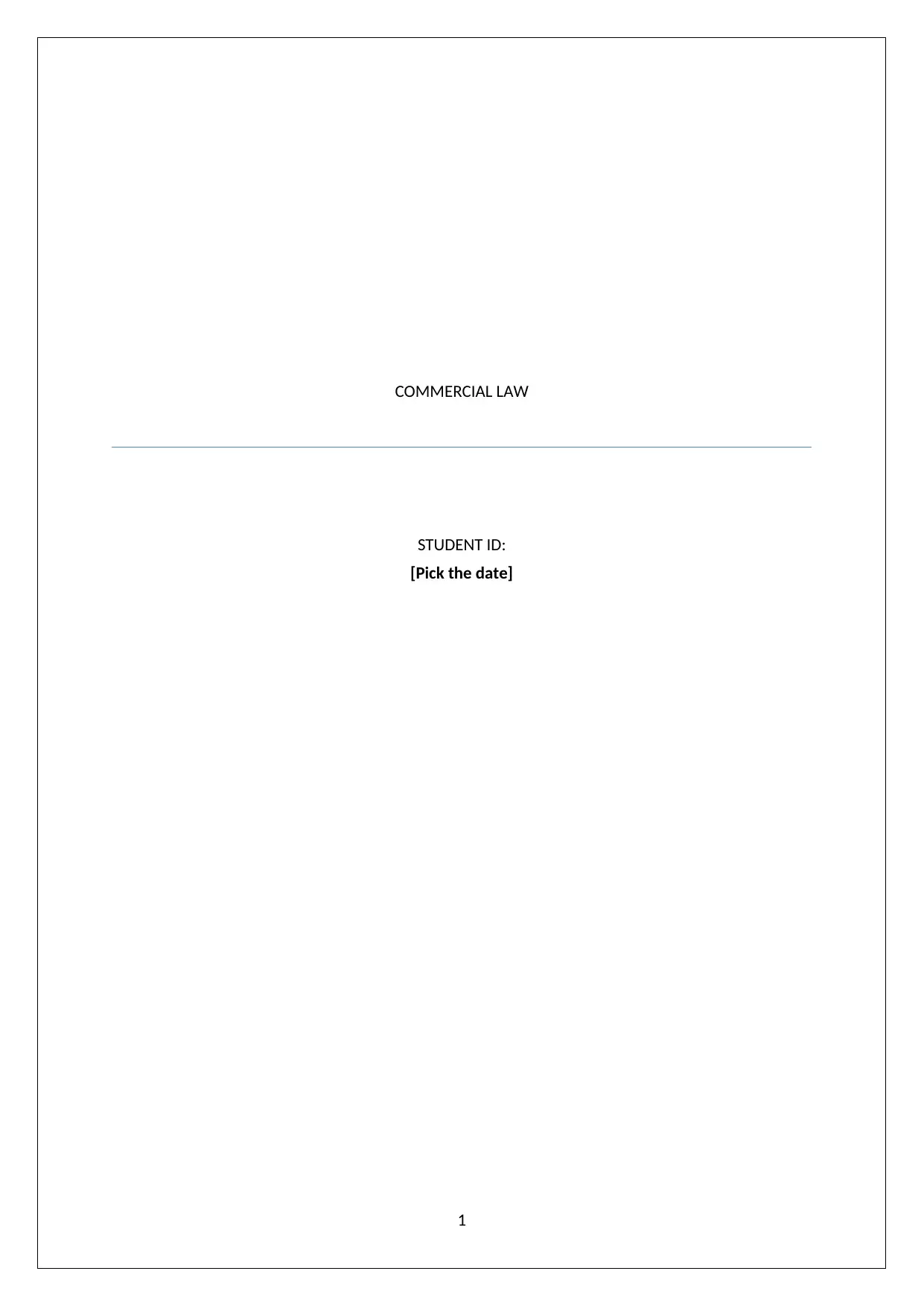
COMMERCIAL LAW
STUDENT ID:
[Pick the date]
1
STUDENT ID:
[Pick the date]
1
Paraphrase This Document
Need a fresh take? Get an instant paraphrase of this document with our AI Paraphraser
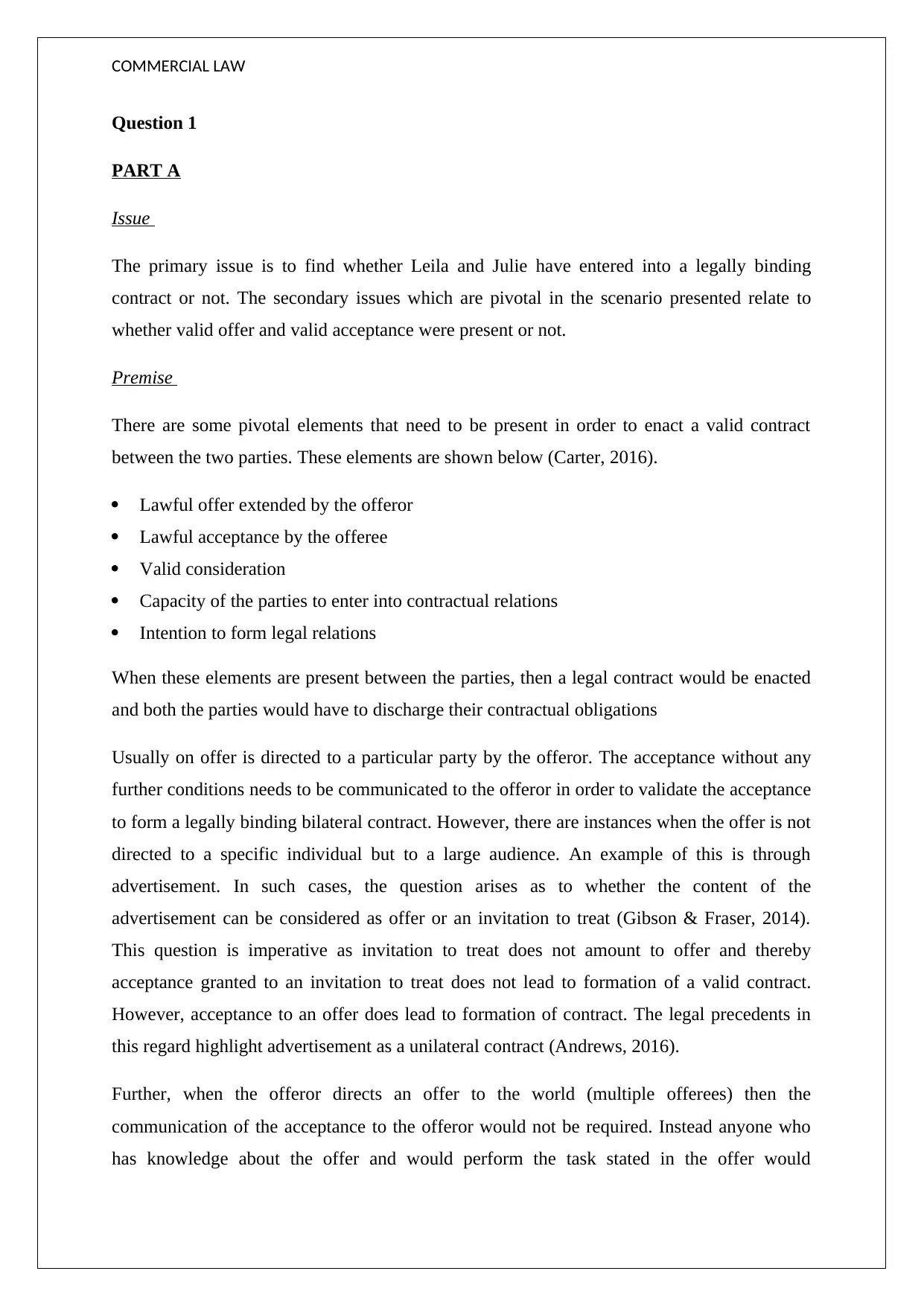
COMMERCIAL LAW
Question 1
PART A
Issue
The primary issue is to find whether Leila and Julie have entered into a legally binding
contract or not. The secondary issues which are pivotal in the scenario presented relate to
whether valid offer and valid acceptance were present or not.
Premise
There are some pivotal elements that need to be present in order to enact a valid contract
between the two parties. These elements are shown below (Carter, 2016).
Lawful offer extended by the offeror
Lawful acceptance by the offeree
Valid consideration
Capacity of the parties to enter into contractual relations
Intention to form legal relations
When these elements are present between the parties, then a legal contract would be enacted
and both the parties would have to discharge their contractual obligations
Usually on offer is directed to a particular party by the offeror. The acceptance without any
further conditions needs to be communicated to the offeror in order to validate the acceptance
to form a legally binding bilateral contract. However, there are instances when the offer is not
directed to a specific individual but to a large audience. An example of this is through
advertisement. In such cases, the question arises as to whether the content of the
advertisement can be considered as offer or an invitation to treat (Gibson & Fraser, 2014).
This question is imperative as invitation to treat does not amount to offer and thereby
acceptance granted to an invitation to treat does not lead to formation of a valid contract.
However, acceptance to an offer does lead to formation of contract. The legal precedents in
this regard highlight advertisement as a unilateral contract (Andrews, 2016).
Further, when the offeror directs an offer to the world (multiple offerees) then the
communication of the acceptance to the offeror would not be required. Instead anyone who
has knowledge about the offer and would perform the task stated in the offer would
Question 1
PART A
Issue
The primary issue is to find whether Leila and Julie have entered into a legally binding
contract or not. The secondary issues which are pivotal in the scenario presented relate to
whether valid offer and valid acceptance were present or not.
Premise
There are some pivotal elements that need to be present in order to enact a valid contract
between the two parties. These elements are shown below (Carter, 2016).
Lawful offer extended by the offeror
Lawful acceptance by the offeree
Valid consideration
Capacity of the parties to enter into contractual relations
Intention to form legal relations
When these elements are present between the parties, then a legal contract would be enacted
and both the parties would have to discharge their contractual obligations
Usually on offer is directed to a particular party by the offeror. The acceptance without any
further conditions needs to be communicated to the offeror in order to validate the acceptance
to form a legally binding bilateral contract. However, there are instances when the offer is not
directed to a specific individual but to a large audience. An example of this is through
advertisement. In such cases, the question arises as to whether the content of the
advertisement can be considered as offer or an invitation to treat (Gibson & Fraser, 2014).
This question is imperative as invitation to treat does not amount to offer and thereby
acceptance granted to an invitation to treat does not lead to formation of a valid contract.
However, acceptance to an offer does lead to formation of contract. The legal precedents in
this regard highlight advertisement as a unilateral contract (Andrews, 2016).
Further, when the offeror directs an offer to the world (multiple offerees) then the
communication of the acceptance to the offeror would not be required. Instead anyone who
has knowledge about the offer and would perform the task stated in the offer would
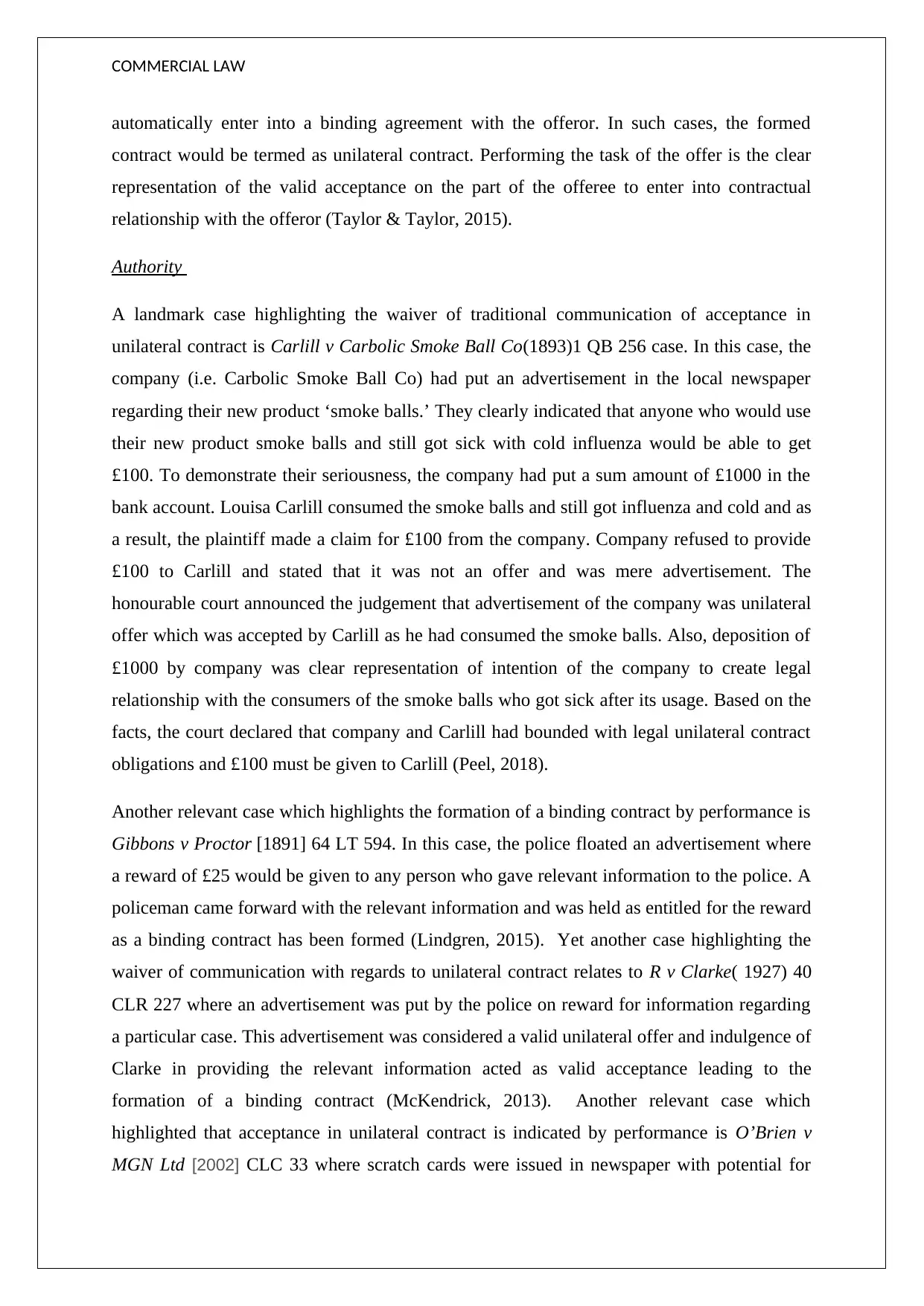
COMMERCIAL LAW
automatically enter into a binding agreement with the offeror. In such cases, the formed
contract would be termed as unilateral contract. Performing the task of the offer is the clear
representation of the valid acceptance on the part of the offeree to enter into contractual
relationship with the offeror (Taylor & Taylor, 2015).
Authority
A landmark case highlighting the waiver of traditional communication of acceptance in
unilateral contract is Carlill v Carbolic Smoke Ball Co(1893)1 QB 256 case. In this case, the
company (i.e. Carbolic Smoke Ball Co) had put an advertisement in the local newspaper
regarding their new product ‘smoke balls.’ They clearly indicated that anyone who would use
their new product smoke balls and still got sick with cold influenza would be able to get
£100. To demonstrate their seriousness, the company had put a sum amount of £1000 in the
bank account. Louisa Carlill consumed the smoke balls and still got influenza and cold and as
a result, the plaintiff made a claim for £100 from the company. Company refused to provide
£100 to Carlill and stated that it was not an offer and was mere advertisement. The
honourable court announced the judgement that advertisement of the company was unilateral
offer which was accepted by Carlill as he had consumed the smoke balls. Also, deposition of
£1000 by company was clear representation of intention of the company to create legal
relationship with the consumers of the smoke balls who got sick after its usage. Based on the
facts, the court declared that company and Carlill had bounded with legal unilateral contract
obligations and £100 must be given to Carlill (Peel, 2018).
Another relevant case which highlights the formation of a binding contract by performance is
Gibbons v Proctor [1891] 64 LT 594. In this case, the police floated an advertisement where
a reward of £25 would be given to any person who gave relevant information to the police. A
policeman came forward with the relevant information and was held as entitled for the reward
as a binding contract has been formed (Lindgren, 2015). Yet another case highlighting the
waiver of communication with regards to unilateral contract relates to R v Clarke( 1927) 40
CLR 227 where an advertisement was put by the police on reward for information regarding
a particular case. This advertisement was considered a valid unilateral offer and indulgence of
Clarke in providing the relevant information acted as valid acceptance leading to the
formation of a binding contract (McKendrick, 2013). Another relevant case which
highlighted that acceptance in unilateral contract is indicated by performance is O’Brien v
MGN Ltd [2002] CLC 33 where scratch cards were issued in newspaper with potential for
automatically enter into a binding agreement with the offeror. In such cases, the formed
contract would be termed as unilateral contract. Performing the task of the offer is the clear
representation of the valid acceptance on the part of the offeree to enter into contractual
relationship with the offeror (Taylor & Taylor, 2015).
Authority
A landmark case highlighting the waiver of traditional communication of acceptance in
unilateral contract is Carlill v Carbolic Smoke Ball Co(1893)1 QB 256 case. In this case, the
company (i.e. Carbolic Smoke Ball Co) had put an advertisement in the local newspaper
regarding their new product ‘smoke balls.’ They clearly indicated that anyone who would use
their new product smoke balls and still got sick with cold influenza would be able to get
£100. To demonstrate their seriousness, the company had put a sum amount of £1000 in the
bank account. Louisa Carlill consumed the smoke balls and still got influenza and cold and as
a result, the plaintiff made a claim for £100 from the company. Company refused to provide
£100 to Carlill and stated that it was not an offer and was mere advertisement. The
honourable court announced the judgement that advertisement of the company was unilateral
offer which was accepted by Carlill as he had consumed the smoke balls. Also, deposition of
£1000 by company was clear representation of intention of the company to create legal
relationship with the consumers of the smoke balls who got sick after its usage. Based on the
facts, the court declared that company and Carlill had bounded with legal unilateral contract
obligations and £100 must be given to Carlill (Peel, 2018).
Another relevant case which highlights the formation of a binding contract by performance is
Gibbons v Proctor [1891] 64 LT 594. In this case, the police floated an advertisement where
a reward of £25 would be given to any person who gave relevant information to the police. A
policeman came forward with the relevant information and was held as entitled for the reward
as a binding contract has been formed (Lindgren, 2015). Yet another case highlighting the
waiver of communication with regards to unilateral contract relates to R v Clarke( 1927) 40
CLR 227 where an advertisement was put by the police on reward for information regarding
a particular case. This advertisement was considered a valid unilateral offer and indulgence of
Clarke in providing the relevant information acted as valid acceptance leading to the
formation of a binding contract (McKendrick, 2013). Another relevant case which
highlighted that acceptance in unilateral contract is indicated by performance is O’Brien v
MGN Ltd [2002] CLC 33 where scratch cards were issued in newspaper with potential for
⊘ This is a preview!⊘
Do you want full access?
Subscribe today to unlock all pages.

Trusted by 1+ million students worldwide
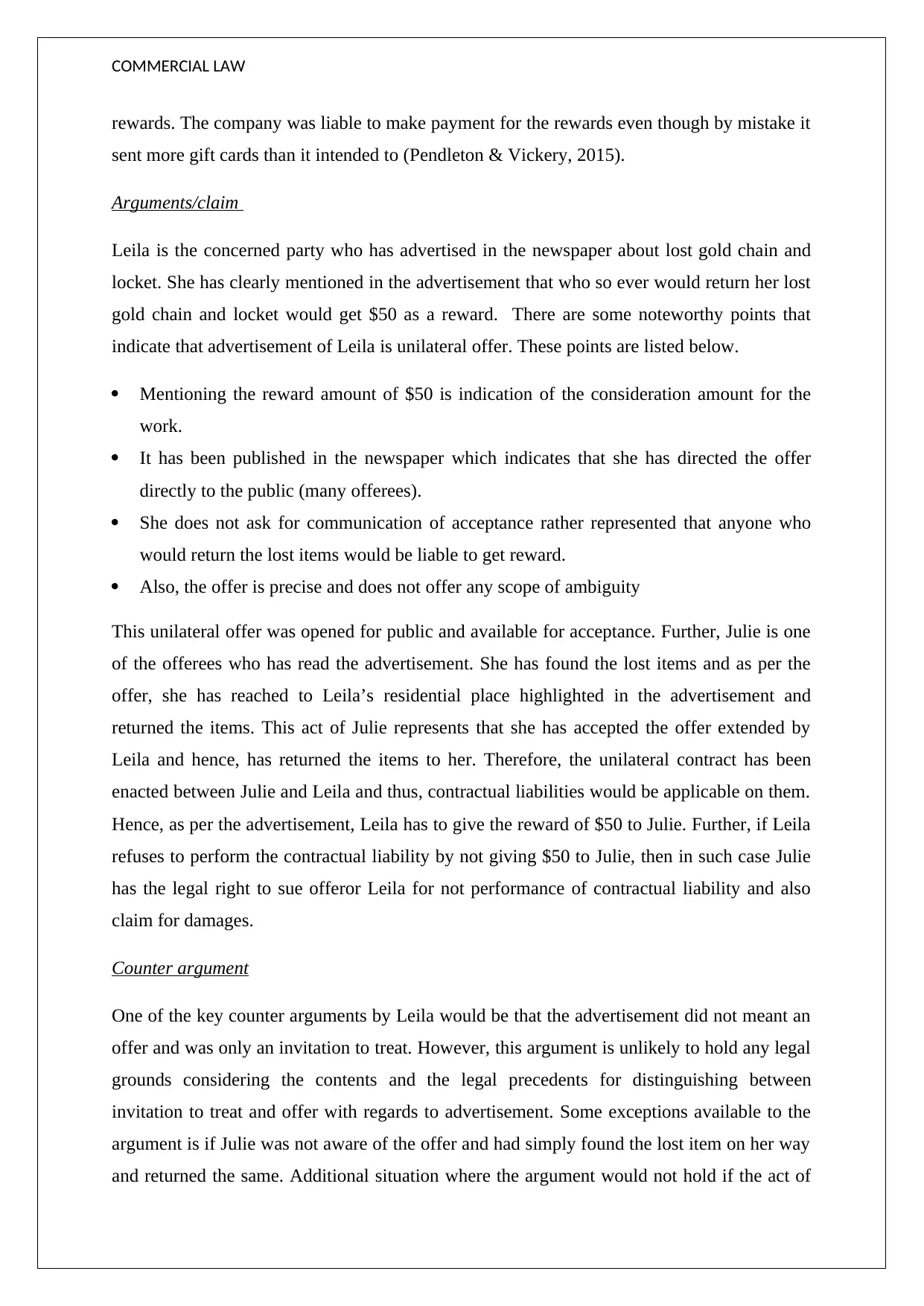
COMMERCIAL LAW
rewards. The company was liable to make payment for the rewards even though by mistake it
sent more gift cards than it intended to (Pendleton & Vickery, 2015).
Arguments/claim
Leila is the concerned party who has advertised in the newspaper about lost gold chain and
locket. She has clearly mentioned in the advertisement that who so ever would return her lost
gold chain and locket would get $50 as a reward. There are some noteworthy points that
indicate that advertisement of Leila is unilateral offer. These points are listed below.
Mentioning the reward amount of $50 is indication of the consideration amount for the
work.
It has been published in the newspaper which indicates that she has directed the offer
directly to the public (many offerees).
She does not ask for communication of acceptance rather represented that anyone who
would return the lost items would be liable to get reward.
Also, the offer is precise and does not offer any scope of ambiguity
This unilateral offer was opened for public and available for acceptance. Further, Julie is one
of the offerees who has read the advertisement. She has found the lost items and as per the
offer, she has reached to Leila’s residential place highlighted in the advertisement and
returned the items. This act of Julie represents that she has accepted the offer extended by
Leila and hence, has returned the items to her. Therefore, the unilateral contract has been
enacted between Julie and Leila and thus, contractual liabilities would be applicable on them.
Hence, as per the advertisement, Leila has to give the reward of $50 to Julie. Further, if Leila
refuses to perform the contractual liability by not giving $50 to Julie, then in such case Julie
has the legal right to sue offeror Leila for not performance of contractual liability and also
claim for damages.
Counter argument
One of the key counter arguments by Leila would be that the advertisement did not meant an
offer and was only an invitation to treat. However, this argument is unlikely to hold any legal
grounds considering the contents and the legal precedents for distinguishing between
invitation to treat and offer with regards to advertisement. Some exceptions available to the
argument is if Julie was not aware of the offer and had simply found the lost item on her way
and returned the same. Additional situation where the argument would not hold if the act of
rewards. The company was liable to make payment for the rewards even though by mistake it
sent more gift cards than it intended to (Pendleton & Vickery, 2015).
Arguments/claim
Leila is the concerned party who has advertised in the newspaper about lost gold chain and
locket. She has clearly mentioned in the advertisement that who so ever would return her lost
gold chain and locket would get $50 as a reward. There are some noteworthy points that
indicate that advertisement of Leila is unilateral offer. These points are listed below.
Mentioning the reward amount of $50 is indication of the consideration amount for the
work.
It has been published in the newspaper which indicates that she has directed the offer
directly to the public (many offerees).
She does not ask for communication of acceptance rather represented that anyone who
would return the lost items would be liable to get reward.
Also, the offer is precise and does not offer any scope of ambiguity
This unilateral offer was opened for public and available for acceptance. Further, Julie is one
of the offerees who has read the advertisement. She has found the lost items and as per the
offer, she has reached to Leila’s residential place highlighted in the advertisement and
returned the items. This act of Julie represents that she has accepted the offer extended by
Leila and hence, has returned the items to her. Therefore, the unilateral contract has been
enacted between Julie and Leila and thus, contractual liabilities would be applicable on them.
Hence, as per the advertisement, Leila has to give the reward of $50 to Julie. Further, if Leila
refuses to perform the contractual liability by not giving $50 to Julie, then in such case Julie
has the legal right to sue offeror Leila for not performance of contractual liability and also
claim for damages.
Counter argument
One of the key counter arguments by Leila would be that the advertisement did not meant an
offer and was only an invitation to treat. However, this argument is unlikely to hold any legal
grounds considering the contents and the legal precedents for distinguishing between
invitation to treat and offer with regards to advertisement. Some exceptions available to the
argument is if Julie was not aware of the offer and had simply found the lost item on her way
and returned the same. Additional situation where the argument would not hold if the act of
Paraphrase This Document
Need a fresh take? Get an instant paraphrase of this document with our AI Paraphraser
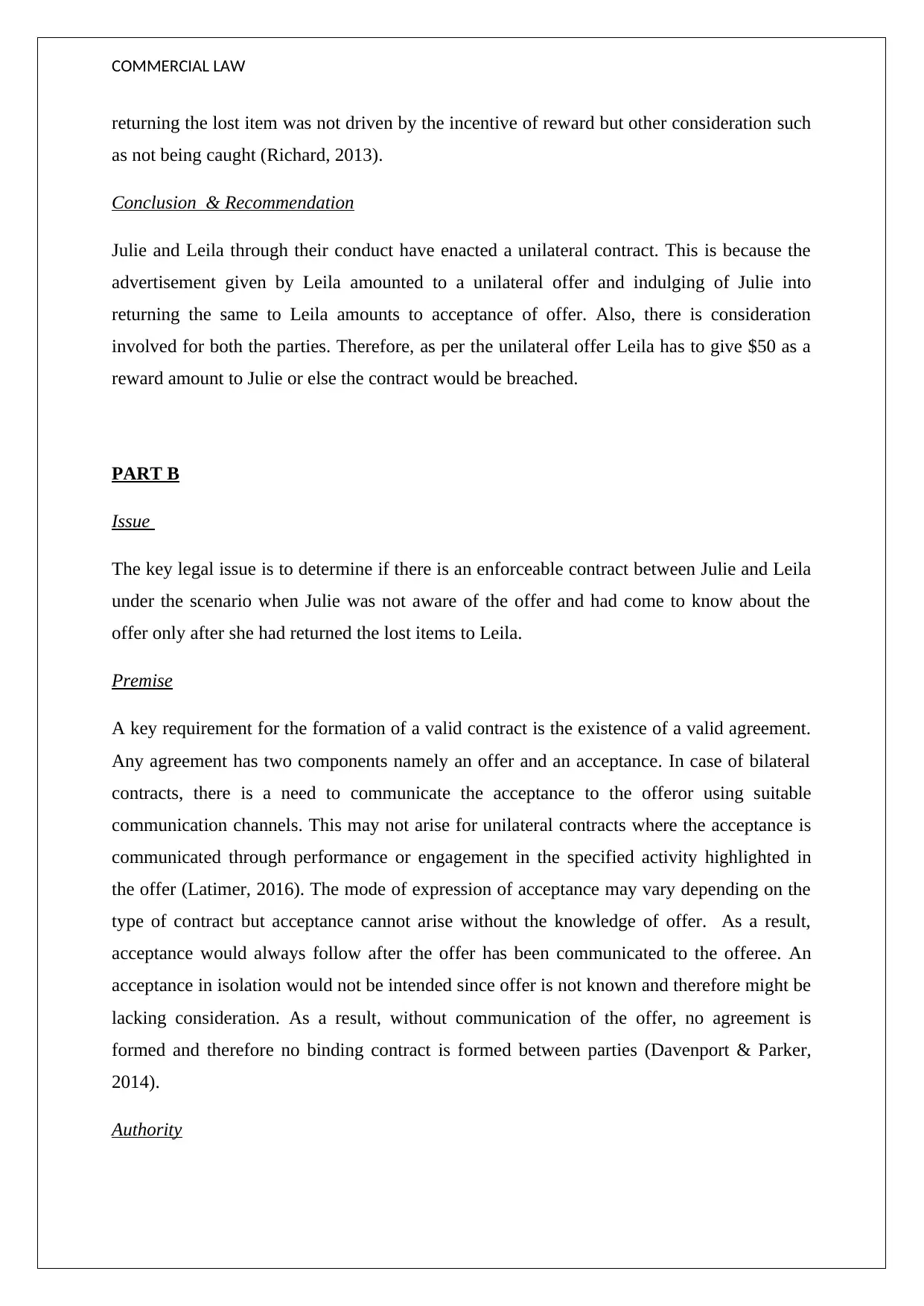
COMMERCIAL LAW
returning the lost item was not driven by the incentive of reward but other consideration such
as not being caught (Richard, 2013).
Conclusion & Recommendation
Julie and Leila through their conduct have enacted a unilateral contract. This is because the
advertisement given by Leila amounted to a unilateral offer and indulging of Julie into
returning the same to Leila amounts to acceptance of offer. Also, there is consideration
involved for both the parties. Therefore, as per the unilateral offer Leila has to give $50 as a
reward amount to Julie or else the contract would be breached.
PART B
Issue
The key legal issue is to determine if there is an enforceable contract between Julie and Leila
under the scenario when Julie was not aware of the offer and had come to know about the
offer only after she had returned the lost items to Leila.
Premise
A key requirement for the formation of a valid contract is the existence of a valid agreement.
Any agreement has two components namely an offer and an acceptance. In case of bilateral
contracts, there is a need to communicate the acceptance to the offeror using suitable
communication channels. This may not arise for unilateral contracts where the acceptance is
communicated through performance or engagement in the specified activity highlighted in
the offer (Latimer, 2016). The mode of expression of acceptance may vary depending on the
type of contract but acceptance cannot arise without the knowledge of offer. As a result,
acceptance would always follow after the offer has been communicated to the offeree. An
acceptance in isolation would not be intended since offer is not known and therefore might be
lacking consideration. As a result, without communication of the offer, no agreement is
formed and therefore no binding contract is formed between parties (Davenport & Parker,
2014).
Authority
returning the lost item was not driven by the incentive of reward but other consideration such
as not being caught (Richard, 2013).
Conclusion & Recommendation
Julie and Leila through their conduct have enacted a unilateral contract. This is because the
advertisement given by Leila amounted to a unilateral offer and indulging of Julie into
returning the same to Leila amounts to acceptance of offer. Also, there is consideration
involved for both the parties. Therefore, as per the unilateral offer Leila has to give $50 as a
reward amount to Julie or else the contract would be breached.
PART B
Issue
The key legal issue is to determine if there is an enforceable contract between Julie and Leila
under the scenario when Julie was not aware of the offer and had come to know about the
offer only after she had returned the lost items to Leila.
Premise
A key requirement for the formation of a valid contract is the existence of a valid agreement.
Any agreement has two components namely an offer and an acceptance. In case of bilateral
contracts, there is a need to communicate the acceptance to the offeror using suitable
communication channels. This may not arise for unilateral contracts where the acceptance is
communicated through performance or engagement in the specified activity highlighted in
the offer (Latimer, 2016). The mode of expression of acceptance may vary depending on the
type of contract but acceptance cannot arise without the knowledge of offer. As a result,
acceptance would always follow after the offer has been communicated to the offeree. An
acceptance in isolation would not be intended since offer is not known and therefore might be
lacking consideration. As a result, without communication of the offer, no agreement is
formed and therefore no binding contract is formed between parties (Davenport & Parker,
2014).
Authority
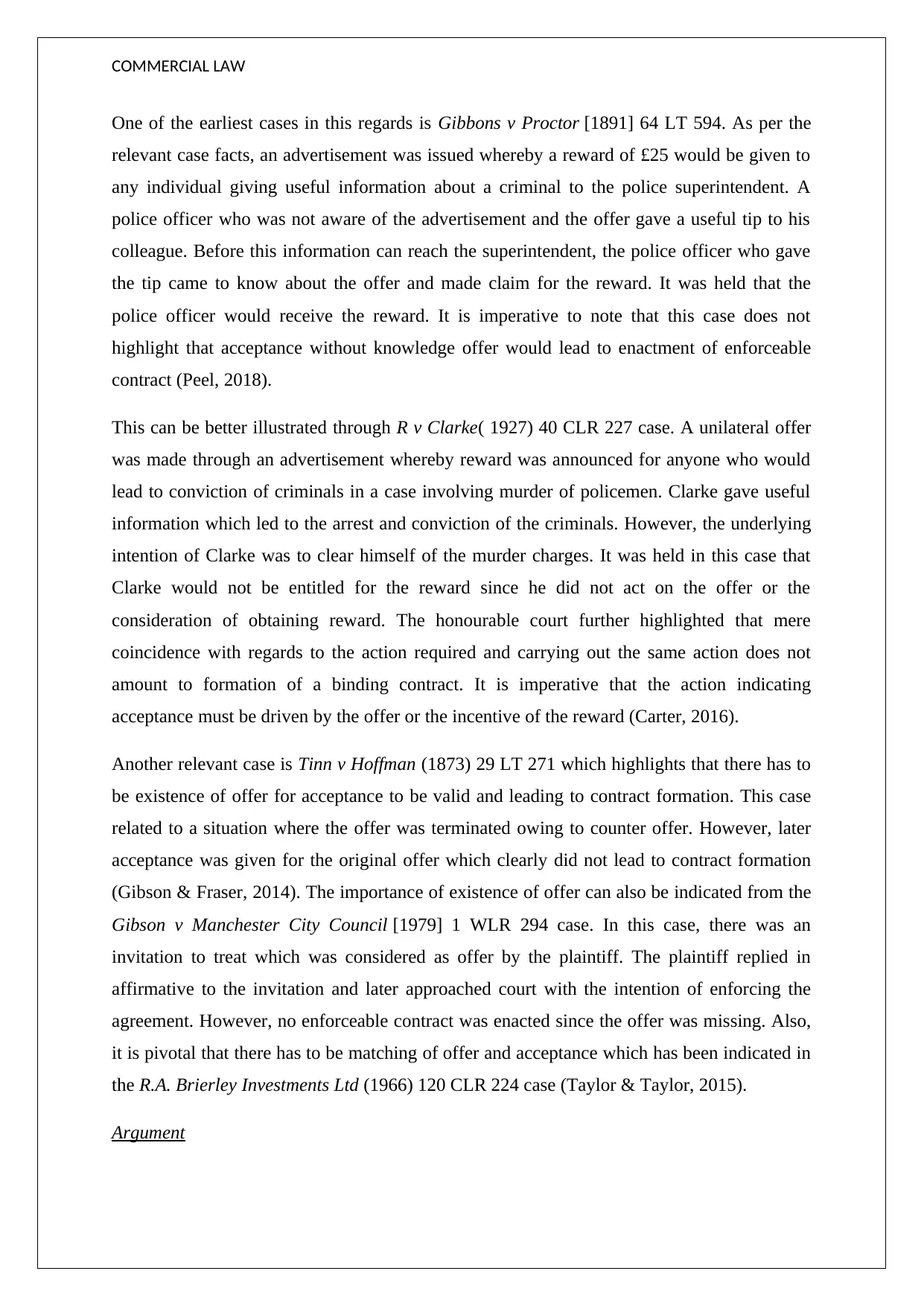
COMMERCIAL LAW
One of the earliest cases in this regards is Gibbons v Proctor [1891] 64 LT 594. As per the
relevant case facts, an advertisement was issued whereby a reward of £25 would be given to
any individual giving useful information about a criminal to the police superintendent. A
police officer who was not aware of the advertisement and the offer gave a useful tip to his
colleague. Before this information can reach the superintendent, the police officer who gave
the tip came to know about the offer and made claim for the reward. It was held that the
police officer would receive the reward. It is imperative to note that this case does not
highlight that acceptance without knowledge offer would lead to enactment of enforceable
contract (Peel, 2018).
This can be better illustrated through R v Clarke( 1927) 40 CLR 227 case. A unilateral offer
was made through an advertisement whereby reward was announced for anyone who would
lead to conviction of criminals in a case involving murder of policemen. Clarke gave useful
information which led to the arrest and conviction of the criminals. However, the underlying
intention of Clarke was to clear himself of the murder charges. It was held in this case that
Clarke would not be entitled for the reward since he did not act on the offer or the
consideration of obtaining reward. The honourable court further highlighted that mere
coincidence with regards to the action required and carrying out the same action does not
amount to formation of a binding contract. It is imperative that the action indicating
acceptance must be driven by the offer or the incentive of the reward (Carter, 2016).
Another relevant case is Tinn v Hoffman (1873) 29 LT 271 which highlights that there has to
be existence of offer for acceptance to be valid and leading to contract formation. This case
related to a situation where the offer was terminated owing to counter offer. However, later
acceptance was given for the original offer which clearly did not lead to contract formation
(Gibson & Fraser, 2014). The importance of existence of offer can also be indicated from the
Gibson v Manchester City Council [1979] 1 WLR 294 case. In this case, there was an
invitation to treat which was considered as offer by the plaintiff. The plaintiff replied in
affirmative to the invitation and later approached court with the intention of enforcing the
agreement. However, no enforceable contract was enacted since the offer was missing. Also,
it is pivotal that there has to be matching of offer and acceptance which has been indicated in
the R.A. Brierley Investments Ltd (1966) 120 CLR 224 case (Taylor & Taylor, 2015).
Argument
One of the earliest cases in this regards is Gibbons v Proctor [1891] 64 LT 594. As per the
relevant case facts, an advertisement was issued whereby a reward of £25 would be given to
any individual giving useful information about a criminal to the police superintendent. A
police officer who was not aware of the advertisement and the offer gave a useful tip to his
colleague. Before this information can reach the superintendent, the police officer who gave
the tip came to know about the offer and made claim for the reward. It was held that the
police officer would receive the reward. It is imperative to note that this case does not
highlight that acceptance without knowledge offer would lead to enactment of enforceable
contract (Peel, 2018).
This can be better illustrated through R v Clarke( 1927) 40 CLR 227 case. A unilateral offer
was made through an advertisement whereby reward was announced for anyone who would
lead to conviction of criminals in a case involving murder of policemen. Clarke gave useful
information which led to the arrest and conviction of the criminals. However, the underlying
intention of Clarke was to clear himself of the murder charges. It was held in this case that
Clarke would not be entitled for the reward since he did not act on the offer or the
consideration of obtaining reward. The honourable court further highlighted that mere
coincidence with regards to the action required and carrying out the same action does not
amount to formation of a binding contract. It is imperative that the action indicating
acceptance must be driven by the offer or the incentive of the reward (Carter, 2016).
Another relevant case is Tinn v Hoffman (1873) 29 LT 271 which highlights that there has to
be existence of offer for acceptance to be valid and leading to contract formation. This case
related to a situation where the offer was terminated owing to counter offer. However, later
acceptance was given for the original offer which clearly did not lead to contract formation
(Gibson & Fraser, 2014). The importance of existence of offer can also be indicated from the
Gibson v Manchester City Council [1979] 1 WLR 294 case. In this case, there was an
invitation to treat which was considered as offer by the plaintiff. The plaintiff replied in
affirmative to the invitation and later approached court with the intention of enforcing the
agreement. However, no enforceable contract was enacted since the offer was missing. Also,
it is pivotal that there has to be matching of offer and acceptance which has been indicated in
the R.A. Brierley Investments Ltd (1966) 120 CLR 224 case (Taylor & Taylor, 2015).
Argument
⊘ This is a preview!⊘
Do you want full access?
Subscribe today to unlock all pages.

Trusted by 1+ million students worldwide
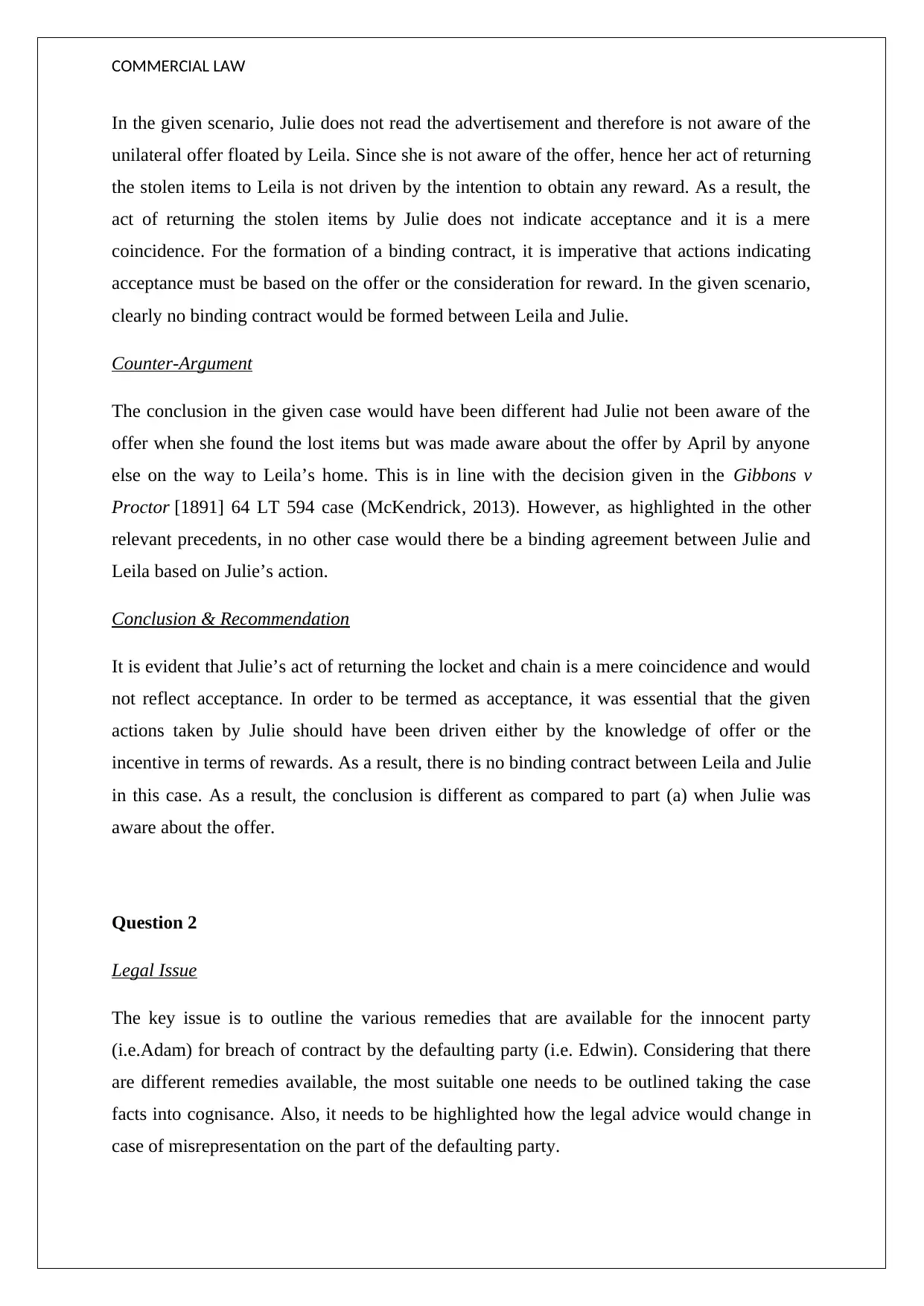
COMMERCIAL LAW
In the given scenario, Julie does not read the advertisement and therefore is not aware of the
unilateral offer floated by Leila. Since she is not aware of the offer, hence her act of returning
the stolen items to Leila is not driven by the intention to obtain any reward. As a result, the
act of returning the stolen items by Julie does not indicate acceptance and it is a mere
coincidence. For the formation of a binding contract, it is imperative that actions indicating
acceptance must be based on the offer or the consideration for reward. In the given scenario,
clearly no binding contract would be formed between Leila and Julie.
Counter-Argument
The conclusion in the given case would have been different had Julie not been aware of the
offer when she found the lost items but was made aware about the offer by April by anyone
else on the way to Leila’s home. This is in line with the decision given in the Gibbons v
Proctor [1891] 64 LT 594 case (McKendrick, 2013). However, as highlighted in the other
relevant precedents, in no other case would there be a binding agreement between Julie and
Leila based on Julie’s action.
Conclusion & Recommendation
It is evident that Julie’s act of returning the locket and chain is a mere coincidence and would
not reflect acceptance. In order to be termed as acceptance, it was essential that the given
actions taken by Julie should have been driven either by the knowledge of offer or the
incentive in terms of rewards. As a result, there is no binding contract between Leila and Julie
in this case. As a result, the conclusion is different as compared to part (a) when Julie was
aware about the offer.
Question 2
Legal Issue
The key issue is to outline the various remedies that are available for the innocent party
(i.e.Adam) for breach of contract by the defaulting party (i.e. Edwin). Considering that there
are different remedies available, the most suitable one needs to be outlined taking the case
facts into cognisance. Also, it needs to be highlighted how the legal advice would change in
case of misrepresentation on the part of the defaulting party.
In the given scenario, Julie does not read the advertisement and therefore is not aware of the
unilateral offer floated by Leila. Since she is not aware of the offer, hence her act of returning
the stolen items to Leila is not driven by the intention to obtain any reward. As a result, the
act of returning the stolen items by Julie does not indicate acceptance and it is a mere
coincidence. For the formation of a binding contract, it is imperative that actions indicating
acceptance must be based on the offer or the consideration for reward. In the given scenario,
clearly no binding contract would be formed between Leila and Julie.
Counter-Argument
The conclusion in the given case would have been different had Julie not been aware of the
offer when she found the lost items but was made aware about the offer by April by anyone
else on the way to Leila’s home. This is in line with the decision given in the Gibbons v
Proctor [1891] 64 LT 594 case (McKendrick, 2013). However, as highlighted in the other
relevant precedents, in no other case would there be a binding agreement between Julie and
Leila based on Julie’s action.
Conclusion & Recommendation
It is evident that Julie’s act of returning the locket and chain is a mere coincidence and would
not reflect acceptance. In order to be termed as acceptance, it was essential that the given
actions taken by Julie should have been driven either by the knowledge of offer or the
incentive in terms of rewards. As a result, there is no binding contract between Leila and Julie
in this case. As a result, the conclusion is different as compared to part (a) when Julie was
aware about the offer.
Question 2
Legal Issue
The key issue is to outline the various remedies that are available for the innocent party
(i.e.Adam) for breach of contract by the defaulting party (i.e. Edwin). Considering that there
are different remedies available, the most suitable one needs to be outlined taking the case
facts into cognisance. Also, it needs to be highlighted how the legal advice would change in
case of misrepresentation on the part of the defaulting party.
Paraphrase This Document
Need a fresh take? Get an instant paraphrase of this document with our AI Paraphraser
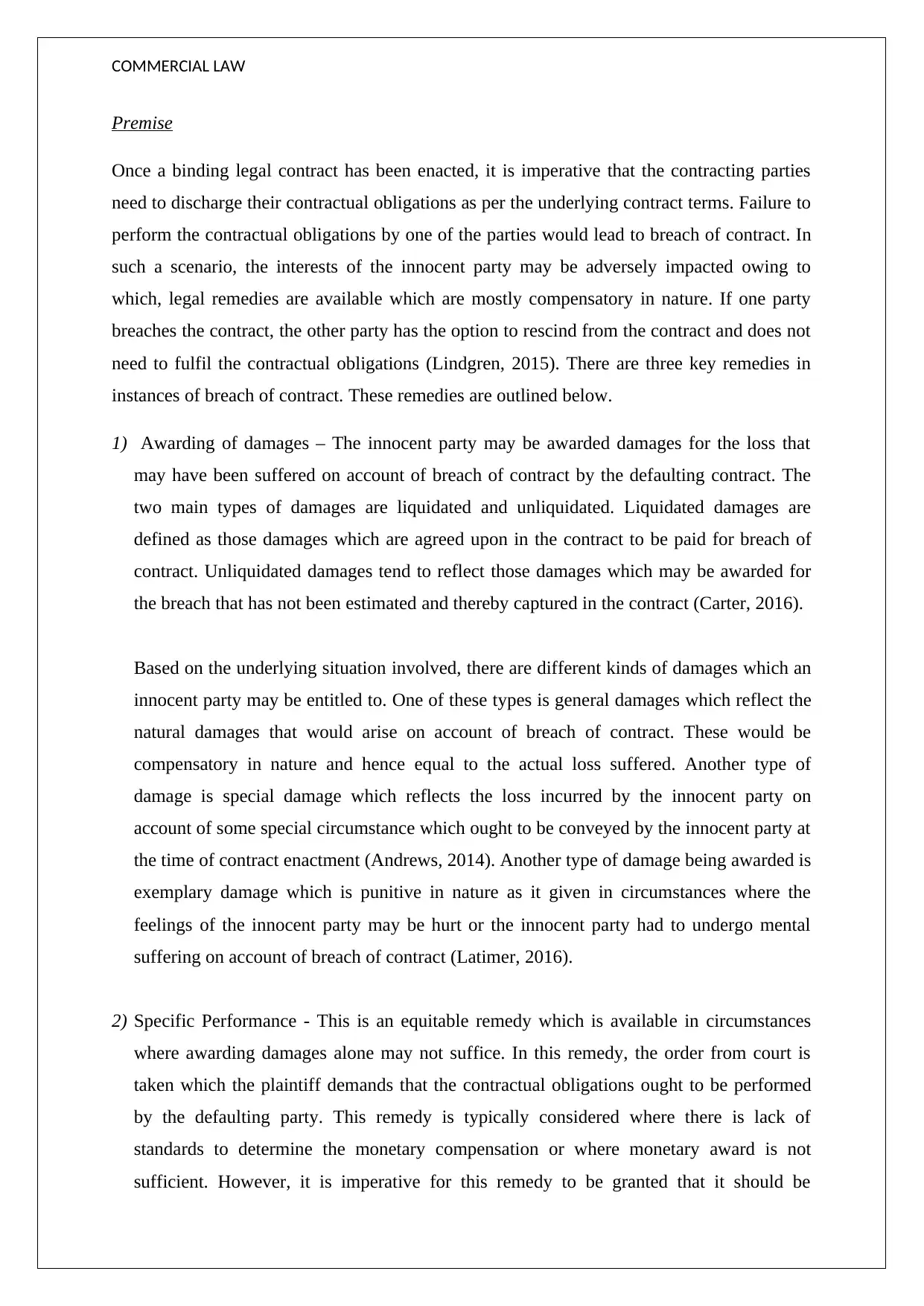
COMMERCIAL LAW
Premise
Once a binding legal contract has been enacted, it is imperative that the contracting parties
need to discharge their contractual obligations as per the underlying contract terms. Failure to
perform the contractual obligations by one of the parties would lead to breach of contract. In
such a scenario, the interests of the innocent party may be adversely impacted owing to
which, legal remedies are available which are mostly compensatory in nature. If one party
breaches the contract, the other party has the option to rescind from the contract and does not
need to fulfil the contractual obligations (Lindgren, 2015). There are three key remedies in
instances of breach of contract. These remedies are outlined below.
1) Awarding of damages – The innocent party may be awarded damages for the loss that
may have been suffered on account of breach of contract by the defaulting contract. The
two main types of damages are liquidated and unliquidated. Liquidated damages are
defined as those damages which are agreed upon in the contract to be paid for breach of
contract. Unliquidated damages tend to reflect those damages which may be awarded for
the breach that has not been estimated and thereby captured in the contract (Carter, 2016).
Based on the underlying situation involved, there are different kinds of damages which an
innocent party may be entitled to. One of these types is general damages which reflect the
natural damages that would arise on account of breach of contract. These would be
compensatory in nature and hence equal to the actual loss suffered. Another type of
damage is special damage which reflects the loss incurred by the innocent party on
account of some special circumstance which ought to be conveyed by the innocent party at
the time of contract enactment (Andrews, 2014). Another type of damage being awarded is
exemplary damage which is punitive in nature as it given in circumstances where the
feelings of the innocent party may be hurt or the innocent party had to undergo mental
suffering on account of breach of contract (Latimer, 2016).
2) Specific Performance - This is an equitable remedy which is available in circumstances
where awarding damages alone may not suffice. In this remedy, the order from court is
taken which the plaintiff demands that the contractual obligations ought to be performed
by the defaulting party. This remedy is typically considered where there is lack of
standards to determine the monetary compensation or where monetary award is not
sufficient. However, it is imperative for this remedy to be granted that it should be
Premise
Once a binding legal contract has been enacted, it is imperative that the contracting parties
need to discharge their contractual obligations as per the underlying contract terms. Failure to
perform the contractual obligations by one of the parties would lead to breach of contract. In
such a scenario, the interests of the innocent party may be adversely impacted owing to
which, legal remedies are available which are mostly compensatory in nature. If one party
breaches the contract, the other party has the option to rescind from the contract and does not
need to fulfil the contractual obligations (Lindgren, 2015). There are three key remedies in
instances of breach of contract. These remedies are outlined below.
1) Awarding of damages – The innocent party may be awarded damages for the loss that
may have been suffered on account of breach of contract by the defaulting contract. The
two main types of damages are liquidated and unliquidated. Liquidated damages are
defined as those damages which are agreed upon in the contract to be paid for breach of
contract. Unliquidated damages tend to reflect those damages which may be awarded for
the breach that has not been estimated and thereby captured in the contract (Carter, 2016).
Based on the underlying situation involved, there are different kinds of damages which an
innocent party may be entitled to. One of these types is general damages which reflect the
natural damages that would arise on account of breach of contract. These would be
compensatory in nature and hence equal to the actual loss suffered. Another type of
damage is special damage which reflects the loss incurred by the innocent party on
account of some special circumstance which ought to be conveyed by the innocent party at
the time of contract enactment (Andrews, 2014). Another type of damage being awarded is
exemplary damage which is punitive in nature as it given in circumstances where the
feelings of the innocent party may be hurt or the innocent party had to undergo mental
suffering on account of breach of contract (Latimer, 2016).
2) Specific Performance - This is an equitable remedy which is available in circumstances
where awarding damages alone may not suffice. In this remedy, the order from court is
taken which the plaintiff demands that the contractual obligations ought to be performed
by the defaulting party. This remedy is typically considered where there is lack of
standards to determine the monetary compensation or where monetary award is not
sufficient. However, it is imperative for this remedy to be granted that it should be
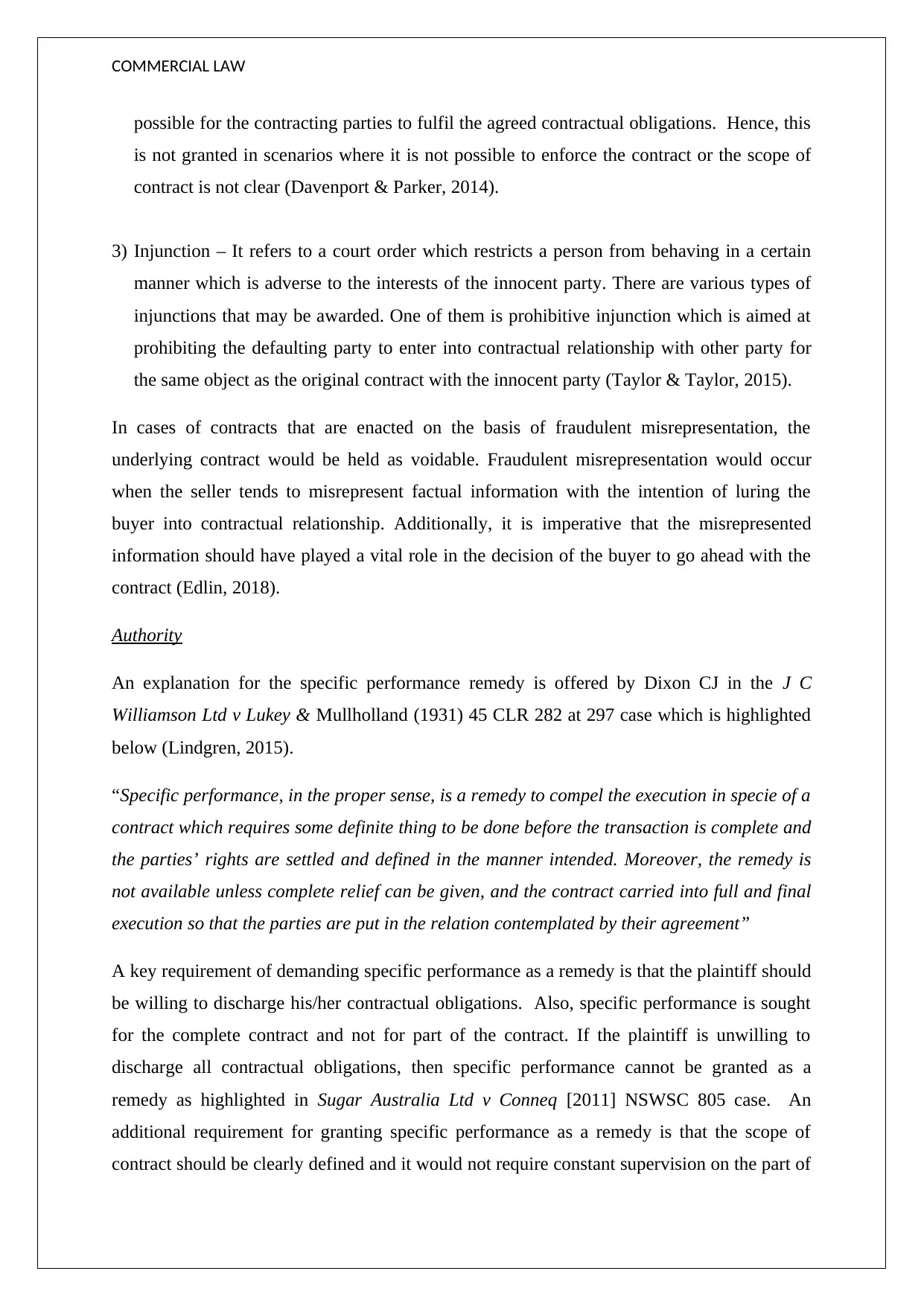
COMMERCIAL LAW
possible for the contracting parties to fulfil the agreed contractual obligations. Hence, this
is not granted in scenarios where it is not possible to enforce the contract or the scope of
contract is not clear (Davenport & Parker, 2014).
3) Injunction – It refers to a court order which restricts a person from behaving in a certain
manner which is adverse to the interests of the innocent party. There are various types of
injunctions that may be awarded. One of them is prohibitive injunction which is aimed at
prohibiting the defaulting party to enter into contractual relationship with other party for
the same object as the original contract with the innocent party (Taylor & Taylor, 2015).
In cases of contracts that are enacted on the basis of fraudulent misrepresentation, the
underlying contract would be held as voidable. Fraudulent misrepresentation would occur
when the seller tends to misrepresent factual information with the intention of luring the
buyer into contractual relationship. Additionally, it is imperative that the misrepresented
information should have played a vital role in the decision of the buyer to go ahead with the
contract (Edlin, 2018).
Authority
An explanation for the specific performance remedy is offered by Dixon CJ in the J C
Williamson Ltd v Lukey & Mullholland (1931) 45 CLR 282 at 297 case which is highlighted
below (Lindgren, 2015).
“Specific performance, in the proper sense, is a remedy to compel the execution in specie of a
contract which requires some definite thing to be done before the transaction is complete and
the parties’ rights are settled and defined in the manner intended. Moreover, the remedy is
not available unless complete relief can be given, and the contract carried into full and final
execution so that the parties are put in the relation contemplated by their agreement”
A key requirement of demanding specific performance as a remedy is that the plaintiff should
be willing to discharge his/her contractual obligations. Also, specific performance is sought
for the complete contract and not for part of the contract. If the plaintiff is unwilling to
discharge all contractual obligations, then specific performance cannot be granted as a
remedy as highlighted in Sugar Australia Ltd v Conneq [2011] NSWSC 805 case. An
additional requirement for granting specific performance as a remedy is that the scope of
contract should be clearly defined and it would not require constant supervision on the part of
possible for the contracting parties to fulfil the agreed contractual obligations. Hence, this
is not granted in scenarios where it is not possible to enforce the contract or the scope of
contract is not clear (Davenport & Parker, 2014).
3) Injunction – It refers to a court order which restricts a person from behaving in a certain
manner which is adverse to the interests of the innocent party. There are various types of
injunctions that may be awarded. One of them is prohibitive injunction which is aimed at
prohibiting the defaulting party to enter into contractual relationship with other party for
the same object as the original contract with the innocent party (Taylor & Taylor, 2015).
In cases of contracts that are enacted on the basis of fraudulent misrepresentation, the
underlying contract would be held as voidable. Fraudulent misrepresentation would occur
when the seller tends to misrepresent factual information with the intention of luring the
buyer into contractual relationship. Additionally, it is imperative that the misrepresented
information should have played a vital role in the decision of the buyer to go ahead with the
contract (Edlin, 2018).
Authority
An explanation for the specific performance remedy is offered by Dixon CJ in the J C
Williamson Ltd v Lukey & Mullholland (1931) 45 CLR 282 at 297 case which is highlighted
below (Lindgren, 2015).
“Specific performance, in the proper sense, is a remedy to compel the execution in specie of a
contract which requires some definite thing to be done before the transaction is complete and
the parties’ rights are settled and defined in the manner intended. Moreover, the remedy is
not available unless complete relief can be given, and the contract carried into full and final
execution so that the parties are put in the relation contemplated by their agreement”
A key requirement of demanding specific performance as a remedy is that the plaintiff should
be willing to discharge his/her contractual obligations. Also, specific performance is sought
for the complete contract and not for part of the contract. If the plaintiff is unwilling to
discharge all contractual obligations, then specific performance cannot be granted as a
remedy as highlighted in Sugar Australia Ltd v Conneq [2011] NSWSC 805 case. An
additional requirement for granting specific performance as a remedy is that the scope of
contract should be clearly defined and it would not require constant supervision on the part of
⊘ This is a preview!⊘
Do you want full access?
Subscribe today to unlock all pages.

Trusted by 1+ million students worldwide
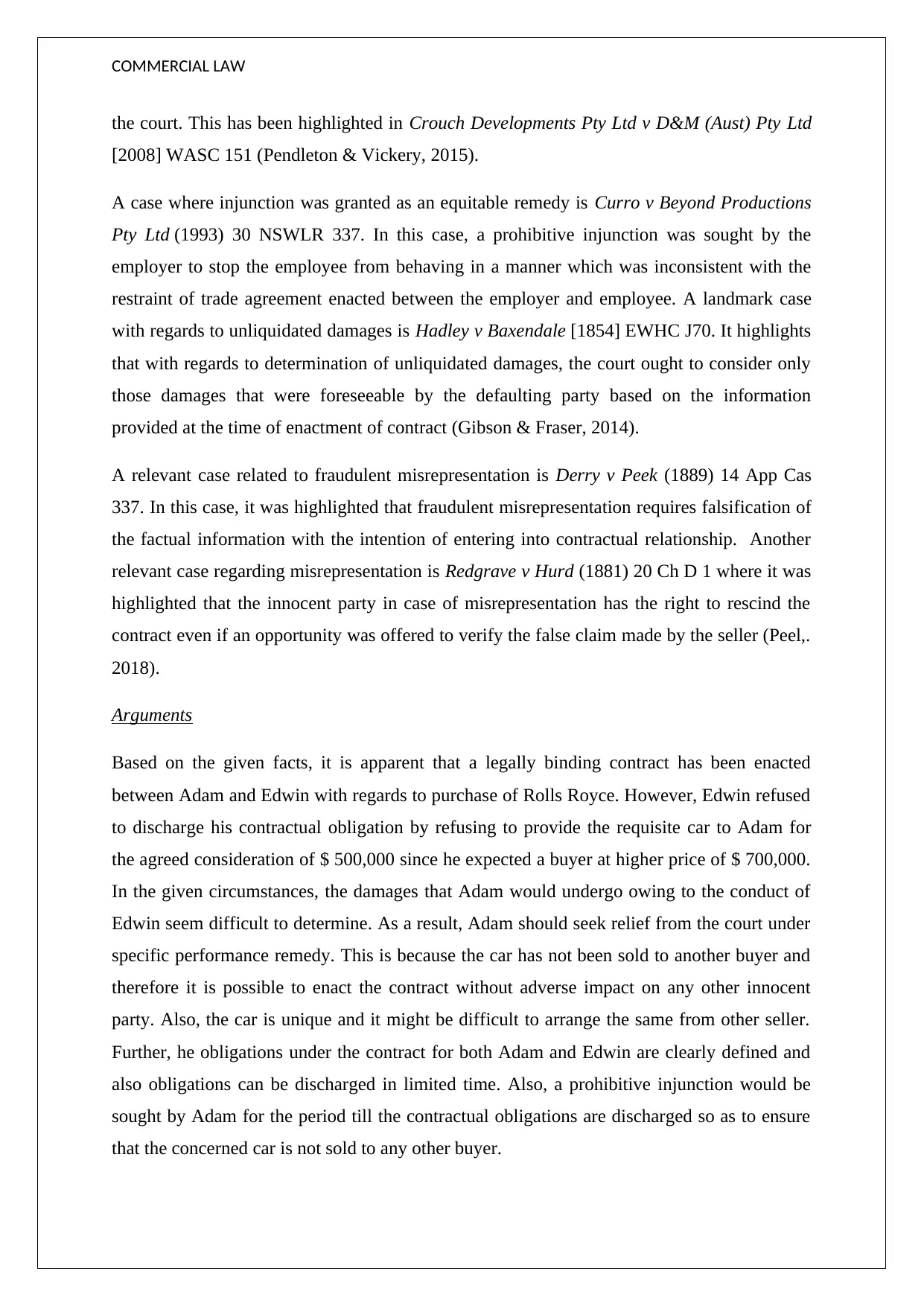
COMMERCIAL LAW
the court. This has been highlighted in Crouch Developments Pty Ltd v D&M (Aust) Pty Ltd
[2008] WASC 151 (Pendleton & Vickery, 2015).
A case where injunction was granted as an equitable remedy is Curro v Beyond Productions
Pty Ltd (1993) 30 NSWLR 337. In this case, a prohibitive injunction was sought by the
employer to stop the employee from behaving in a manner which was inconsistent with the
restraint of trade agreement enacted between the employer and employee. A landmark case
with regards to unliquidated damages is Hadley v Baxendale [1854] EWHC J70. It highlights
that with regards to determination of unliquidated damages, the court ought to consider only
those damages that were foreseeable by the defaulting party based on the information
provided at the time of enactment of contract (Gibson & Fraser, 2014).
A relevant case related to fraudulent misrepresentation is Derry v Peek (1889) 14 App Cas
337. In this case, it was highlighted that fraudulent misrepresentation requires falsification of
the factual information with the intention of entering into contractual relationship. Another
relevant case regarding misrepresentation is Redgrave v Hurd (1881) 20 Ch D 1 where it was
highlighted that the innocent party in case of misrepresentation has the right to rescind the
contract even if an opportunity was offered to verify the false claim made by the seller (Peel,.
2018).
Arguments
Based on the given facts, it is apparent that a legally binding contract has been enacted
between Adam and Edwin with regards to purchase of Rolls Royce. However, Edwin refused
to discharge his contractual obligation by refusing to provide the requisite car to Adam for
the agreed consideration of $ 500,000 since he expected a buyer at higher price of $ 700,000.
In the given circumstances, the damages that Adam would undergo owing to the conduct of
Edwin seem difficult to determine. As a result, Adam should seek relief from the court under
specific performance remedy. This is because the car has not been sold to another buyer and
therefore it is possible to enact the contract without adverse impact on any other innocent
party. Also, the car is unique and it might be difficult to arrange the same from other seller.
Further, he obligations under the contract for both Adam and Edwin are clearly defined and
also obligations can be discharged in limited time. Also, a prohibitive injunction would be
sought by Adam for the period till the contractual obligations are discharged so as to ensure
that the concerned car is not sold to any other buyer.
the court. This has been highlighted in Crouch Developments Pty Ltd v D&M (Aust) Pty Ltd
[2008] WASC 151 (Pendleton & Vickery, 2015).
A case where injunction was granted as an equitable remedy is Curro v Beyond Productions
Pty Ltd (1993) 30 NSWLR 337. In this case, a prohibitive injunction was sought by the
employer to stop the employee from behaving in a manner which was inconsistent with the
restraint of trade agreement enacted between the employer and employee. A landmark case
with regards to unliquidated damages is Hadley v Baxendale [1854] EWHC J70. It highlights
that with regards to determination of unliquidated damages, the court ought to consider only
those damages that were foreseeable by the defaulting party based on the information
provided at the time of enactment of contract (Gibson & Fraser, 2014).
A relevant case related to fraudulent misrepresentation is Derry v Peek (1889) 14 App Cas
337. In this case, it was highlighted that fraudulent misrepresentation requires falsification of
the factual information with the intention of entering into contractual relationship. Another
relevant case regarding misrepresentation is Redgrave v Hurd (1881) 20 Ch D 1 where it was
highlighted that the innocent party in case of misrepresentation has the right to rescind the
contract even if an opportunity was offered to verify the false claim made by the seller (Peel,.
2018).
Arguments
Based on the given facts, it is apparent that a legally binding contract has been enacted
between Adam and Edwin with regards to purchase of Rolls Royce. However, Edwin refused
to discharge his contractual obligation by refusing to provide the requisite car to Adam for
the agreed consideration of $ 500,000 since he expected a buyer at higher price of $ 700,000.
In the given circumstances, the damages that Adam would undergo owing to the conduct of
Edwin seem difficult to determine. As a result, Adam should seek relief from the court under
specific performance remedy. This is because the car has not been sold to another buyer and
therefore it is possible to enact the contract without adverse impact on any other innocent
party. Also, the car is unique and it might be difficult to arrange the same from other seller.
Further, he obligations under the contract for both Adam and Edwin are clearly defined and
also obligations can be discharged in limited time. Also, a prohibitive injunction would be
sought by Adam for the period till the contractual obligations are discharged so as to ensure
that the concerned car is not sold to any other buyer.
Paraphrase This Document
Need a fresh take? Get an instant paraphrase of this document with our AI Paraphraser
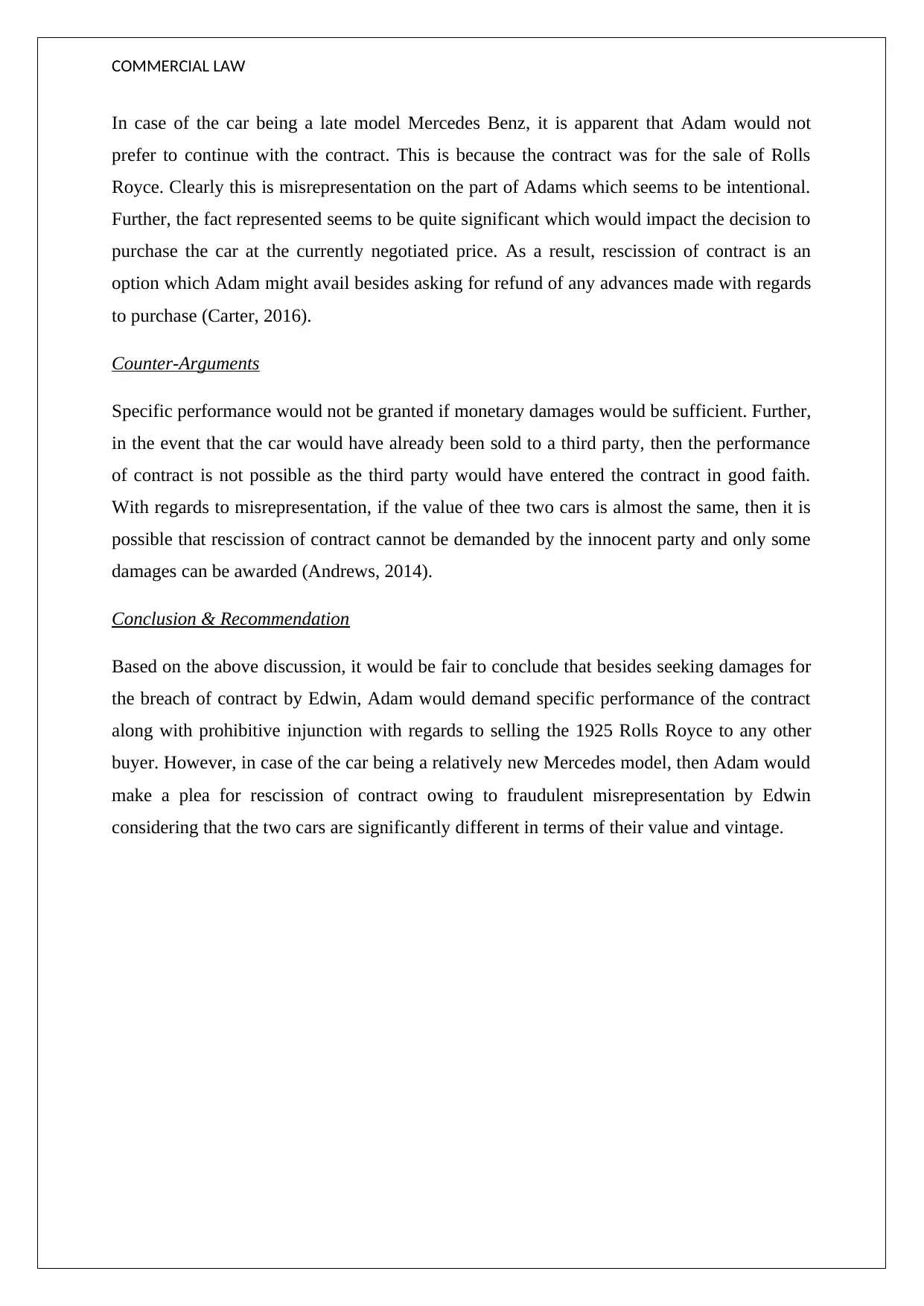
COMMERCIAL LAW
In case of the car being a late model Mercedes Benz, it is apparent that Adam would not
prefer to continue with the contract. This is because the contract was for the sale of Rolls
Royce. Clearly this is misrepresentation on the part of Adams which seems to be intentional.
Further, the fact represented seems to be quite significant which would impact the decision to
purchase the car at the currently negotiated price. As a result, rescission of contract is an
option which Adam might avail besides asking for refund of any advances made with regards
to purchase (Carter, 2016).
Counter-Arguments
Specific performance would not be granted if monetary damages would be sufficient. Further,
in the event that the car would have already been sold to a third party, then the performance
of contract is not possible as the third party would have entered the contract in good faith.
With regards to misrepresentation, if the value of thee two cars is almost the same, then it is
possible that rescission of contract cannot be demanded by the innocent party and only some
damages can be awarded (Andrews, 2014).
Conclusion & Recommendation
Based on the above discussion, it would be fair to conclude that besides seeking damages for
the breach of contract by Edwin, Adam would demand specific performance of the contract
along with prohibitive injunction with regards to selling the 1925 Rolls Royce to any other
buyer. However, in case of the car being a relatively new Mercedes model, then Adam would
make a plea for rescission of contract owing to fraudulent misrepresentation by Edwin
considering that the two cars are significantly different in terms of their value and vintage.
In case of the car being a late model Mercedes Benz, it is apparent that Adam would not
prefer to continue with the contract. This is because the contract was for the sale of Rolls
Royce. Clearly this is misrepresentation on the part of Adams which seems to be intentional.
Further, the fact represented seems to be quite significant which would impact the decision to
purchase the car at the currently negotiated price. As a result, rescission of contract is an
option which Adam might avail besides asking for refund of any advances made with regards
to purchase (Carter, 2016).
Counter-Arguments
Specific performance would not be granted if monetary damages would be sufficient. Further,
in the event that the car would have already been sold to a third party, then the performance
of contract is not possible as the third party would have entered the contract in good faith.
With regards to misrepresentation, if the value of thee two cars is almost the same, then it is
possible that rescission of contract cannot be demanded by the innocent party and only some
damages can be awarded (Andrews, 2014).
Conclusion & Recommendation
Based on the above discussion, it would be fair to conclude that besides seeking damages for
the breach of contract by Edwin, Adam would demand specific performance of the contract
along with prohibitive injunction with regards to selling the 1925 Rolls Royce to any other
buyer. However, in case of the car being a relatively new Mercedes model, then Adam would
make a plea for rescission of contract owing to fraudulent misrepresentation by Edwin
considering that the two cars are significantly different in terms of their value and vintage.
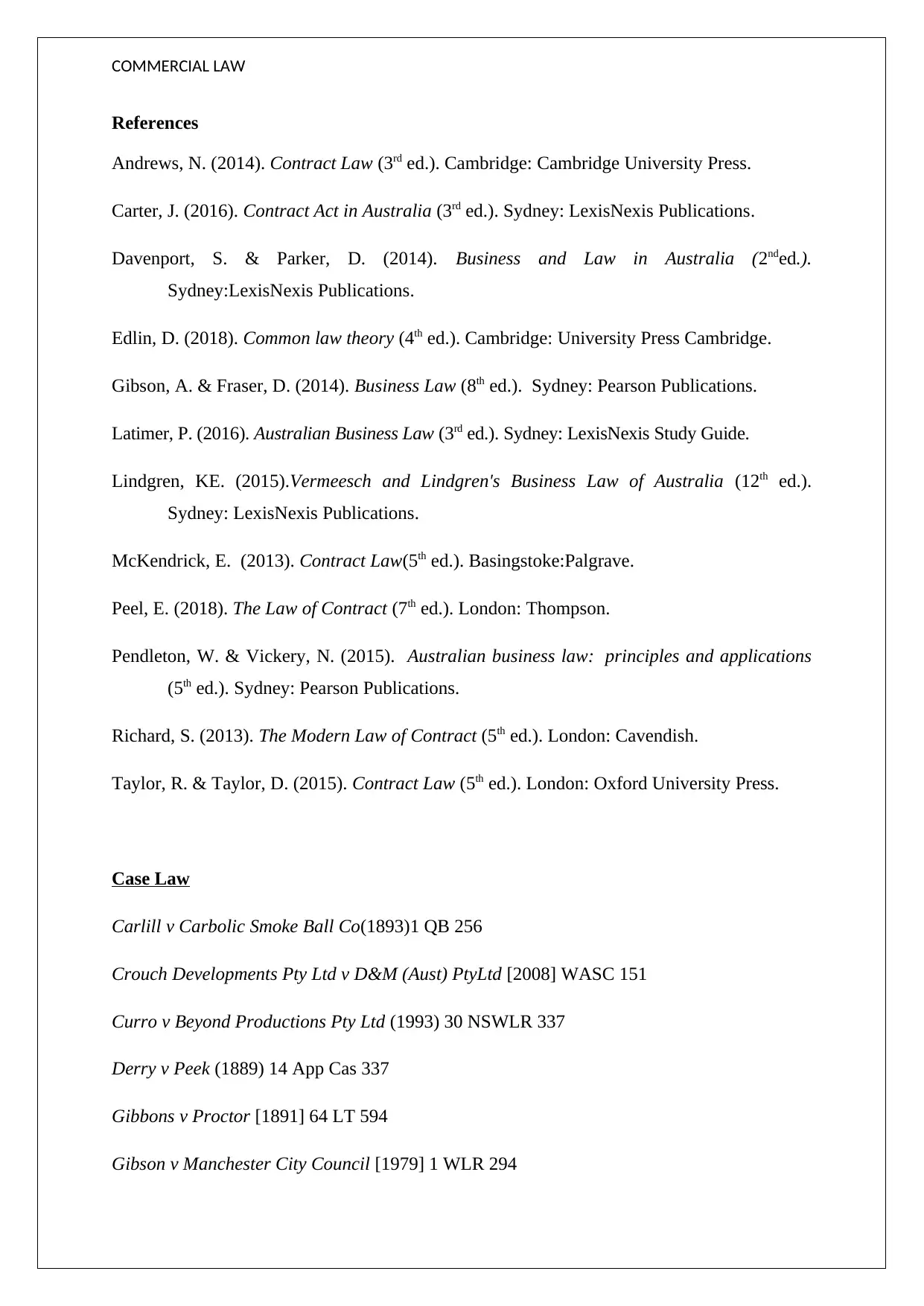
COMMERCIAL LAW
References
Andrews, N. (2014). Contract Law (3rd ed.). Cambridge: Cambridge University Press.
Carter, J. (2016). Contract Act in Australia (3rd ed.). Sydney: LexisNexis Publications.
Davenport, S. & Parker, D. (2014). Business and Law in Australia (2nded.).
Sydney:LexisNexis Publications.
Edlin, D. (2018). Common law theory (4th ed.). Cambridge: University Press Cambridge.
Gibson, A. & Fraser, D. (2014). Business Law (8th ed.). Sydney: Pearson Publications.
Latimer, P. (2016). Australian Business Law (3rd ed.). Sydney: LexisNexis Study Guide.
Lindgren, KE. (2015).Vermeesch and Lindgren's Business Law of Australia (12th ed.).
Sydney: LexisNexis Publications.
McKendrick, E. (2013). Contract Law(5th ed.). Basingstoke:Palgrave.
Peel, E. (2018). The Law of Contract (7th ed.). London: Thompson.
Pendleton, W. & Vickery, N. (2015). Australian business law: principles and applications
(5th ed.). Sydney: Pearson Publications.
Richard, S. (2013). The Modern Law of Contract (5th ed.). London: Cavendish.
Taylor, R. & Taylor, D. (2015). Contract Law (5th ed.). London: Oxford University Press.
Case Law
Carlill v Carbolic Smoke Ball Co(1893)1 QB 256
Crouch Developments Pty Ltd v D&M (Aust) PtyLtd [2008] WASC 151
Curro v Beyond Productions Pty Ltd (1993) 30 NSWLR 337
Derry v Peek (1889) 14 App Cas 337
Gibbons v Proctor [1891] 64 LT 594
Gibson v Manchester City Council [1979] 1 WLR 294
References
Andrews, N. (2014). Contract Law (3rd ed.). Cambridge: Cambridge University Press.
Carter, J. (2016). Contract Act in Australia (3rd ed.). Sydney: LexisNexis Publications.
Davenport, S. & Parker, D. (2014). Business and Law in Australia (2nded.).
Sydney:LexisNexis Publications.
Edlin, D. (2018). Common law theory (4th ed.). Cambridge: University Press Cambridge.
Gibson, A. & Fraser, D. (2014). Business Law (8th ed.). Sydney: Pearson Publications.
Latimer, P. (2016). Australian Business Law (3rd ed.). Sydney: LexisNexis Study Guide.
Lindgren, KE. (2015).Vermeesch and Lindgren's Business Law of Australia (12th ed.).
Sydney: LexisNexis Publications.
McKendrick, E. (2013). Contract Law(5th ed.). Basingstoke:Palgrave.
Peel, E. (2018). The Law of Contract (7th ed.). London: Thompson.
Pendleton, W. & Vickery, N. (2015). Australian business law: principles and applications
(5th ed.). Sydney: Pearson Publications.
Richard, S. (2013). The Modern Law of Contract (5th ed.). London: Cavendish.
Taylor, R. & Taylor, D. (2015). Contract Law (5th ed.). London: Oxford University Press.
Case Law
Carlill v Carbolic Smoke Ball Co(1893)1 QB 256
Crouch Developments Pty Ltd v D&M (Aust) PtyLtd [2008] WASC 151
Curro v Beyond Productions Pty Ltd (1993) 30 NSWLR 337
Derry v Peek (1889) 14 App Cas 337
Gibbons v Proctor [1891] 64 LT 594
Gibson v Manchester City Council [1979] 1 WLR 294
⊘ This is a preview!⊘
Do you want full access?
Subscribe today to unlock all pages.

Trusted by 1+ million students worldwide
1 out of 13
Related Documents
Your All-in-One AI-Powered Toolkit for Academic Success.
+13062052269
info@desklib.com
Available 24*7 on WhatsApp / Email
![[object Object]](/_next/static/media/star-bottom.7253800d.svg)
Unlock your academic potential
Copyright © 2020–2026 A2Z Services. All Rights Reserved. Developed and managed by ZUCOL.




